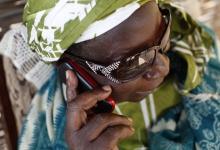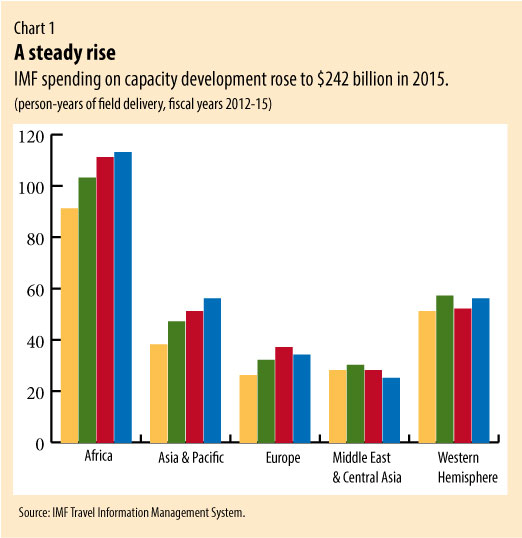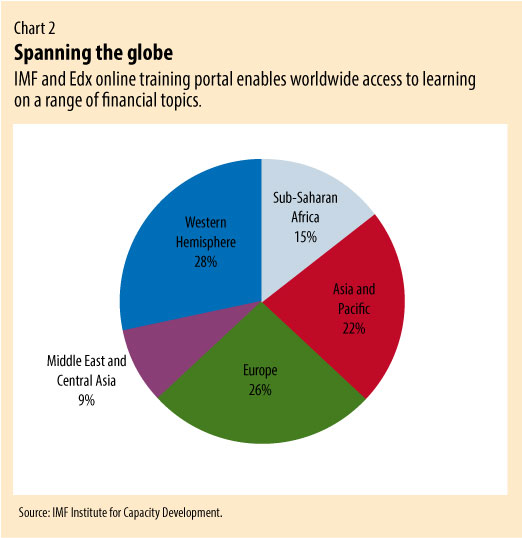
Typical street scene in Santa Ana, El Salvador. (Photo: iStock)
IMF Survey : IMF Steps Up Training and Expert Advice Worldwide
October 1, 2015
- IMF spending on capacity development up for fifth straight year, to $242 million
- Largest share of IMF technical assistance and training went to Africa, including Ebola-afflicted countries
- Free online courses boost participation by country officials and general public
In response to continued high demand from its membership across the globe, the International Monetary Fund has increased its spending on capacity development for the fifth straight year and expanded its training program to anyone with an Internet connection, according to the IMF’s latest Annual Report, released October 1.

Senegalese woman conducting business by mobile phone: Demand for technical assistance to help strengthen banking and other financial systems is rising (photo: Philippe Lissac/Corbis)
IMF Annual Report 2015
The IMF Annual Report 2015—Tackling Challenges Together, covers the activities of the IMF Executive Board, management, and staff during the financial year that ran from May 1, 2014 through April 30, 2015.
IMF expert advice, or technical assistance, and training—which it calls capacity development—accounts for one quarter of the IMF’s activities. According to the report, about half of all IMF technical assistance goes to low-income developing countries, and the remaining amount to emerging market economies, with some advanced economies receiving technical assistance as well (see Chart 1).
Expertise in demand
Chief among the IMF’s areas of expertise in demand is on fiscal issues, as countries across the globe struggle to address the lasting impact of the global financial crisis. In Egypt and Tunisia, for example, the IMF provided support for public financial management, and tax and revenue administration reforms. In Angola, the IMF’s advice on fuel subsidy reform helped to devise a strategy to gradually eliminate costly, inefficient, and inequitable subsidies, and in Tanzania, help was given to preparing a fiscal and budget policy framework for the management of revenues from natural gas production. The IMF also helped Ukraine develop an institutional framework to prevent corruption.
Countries also seek IMF expertise on monetary and financial issues. For example, IMF support on banking supervision in Cambodia, Myanmar, Nepal, and the Philippines helped establish the fundamental supervisory and regulatory infrastructures to strengthen the banking system and safeguard financial stability. Other countries, including the Caribbean, Barbados, Belize, Jamaica, and Suriname, received assistance to improve the functioning of their domestic debt markets, and in central banking. More specifically, bank personnel in IMF member countries receive training to help them identify and analyze sources of risks in the financial system and take preemptive action to address them. The ultimate goal is to strengthen countries’ banking supervisory systems and practices in order to minimize the risk of bank failure.
Quick response
The IMF was quick to respond during recent national emergencies. In the case of the Ebola pandemic in Guinea, Liberia, and Sierra Leone, the IMF provided fast-disbursing emergency funding, and continuously delivered urgently-needed technical assistance remotely from its headquarters and regional technical assistance centers in Ghana (AFRITAC West 2), and Côte d’Ivoire (AFRITAC West 1). The assistance included advice to Liberia on a semi-autonomous revenue authority, to Sierra Leone on improving the collecting revenues from the extractive industry, and to Guinea to maintaining capacity in public financial management.
The IMF has been expanding its network of Regional Technical Assistance Centers (RTACs) in the field. The centers provide hands-on and longer-term support and guidance to country authorities on fiscal affairs, macroeconomic statistics, and financial sector issues. Nine centers serve countries in Africa, the Caribbean, Central America, the Middle East, and the Pacific. Technical assistance provided by the IMF through RTACs reached a peak of 38.3 percent of the total delivered in FY2015, according to the Annual Report.
Free training for all
Among the IMF’s innovations during the year, the institution partnered with edX, a nonprofit online learning initiative funded by Harvard University and the Massachusetts Institute of Technology, to expand IMF training to more member country officials and offer free access to its courses through so-called massive open online courses (MOOCs). In addition to government officials, students, researchers, academics, journalists, and others in all regions of the globe can now participate in IMF training (see Chart 2).
A sample of the many online courses offered include Financial Programming and Policies, Part 1: Macroeconomic Accounts and Analysis (also available in French and Spanish and shortly in Russian); Debt Sustainability Analysis; and Energy Subsidy Reform.
A revamped Annual Report
The report offers a radical change in direction in the IMF’s presentation of its activities, operations, analysis, and finances. Following a broader trend to make corporate annual reports more engaging, the 2015 edition combines feature articles, thematic organization, and infographics, with online innovation.
The IMF’s Annual Report 2015 is available in print in eight languages (Arabic, Chinese, English, French, German, Japanese, Russian, and Spanish), and on CD-ROM (in English only). The Annual Report web page, now in full html format, includes the IMF’s financial statements for FY2015 and other background documentation. Copies of the Annual Report, the financial statements, and the CD-ROM are available free of charge from IMF Publication Services, P.O. Box 92780, Washington, DC 20090, online at www.imfbookstore.org or www.elibrary.imf.org, or by e-mail at publications@imf.org.









